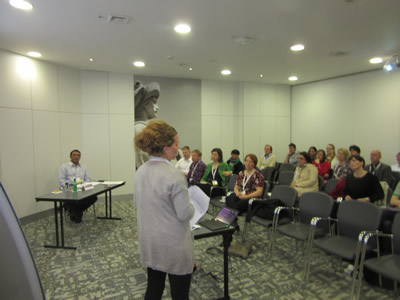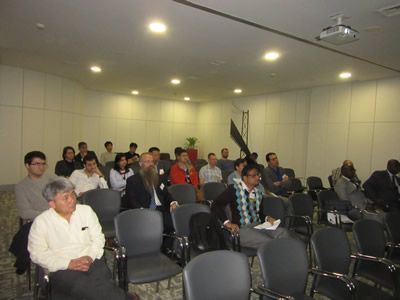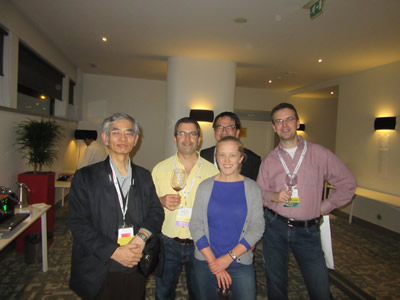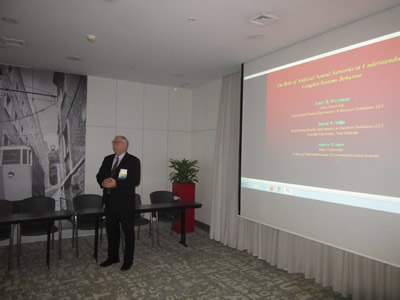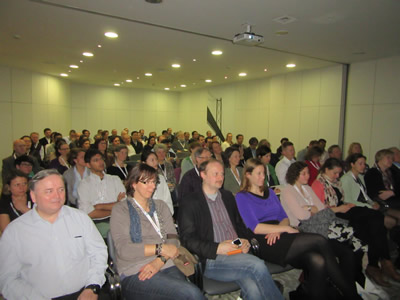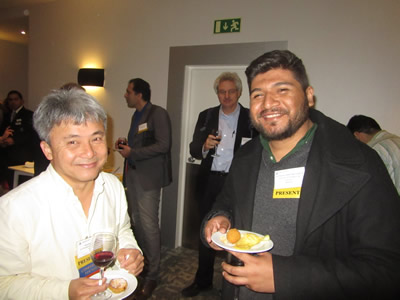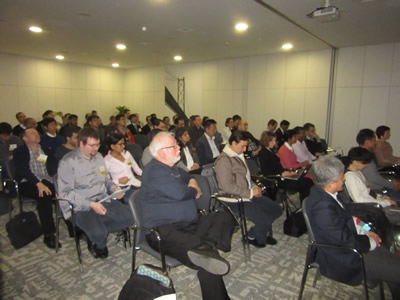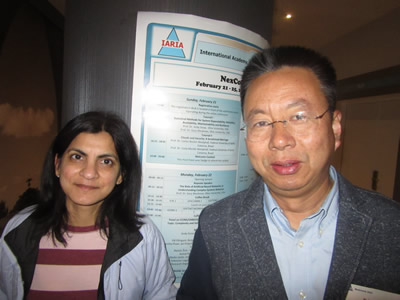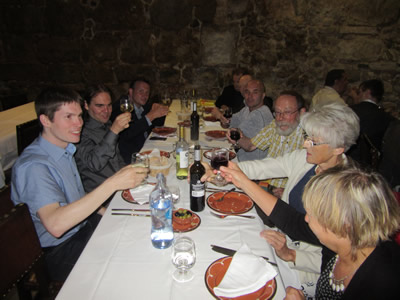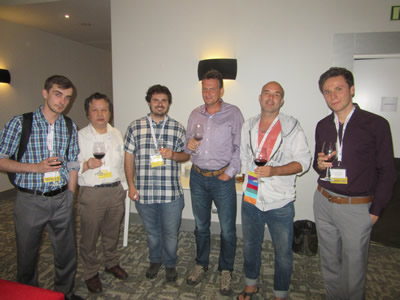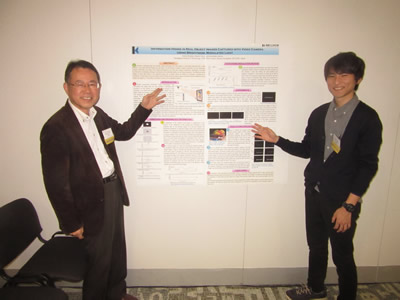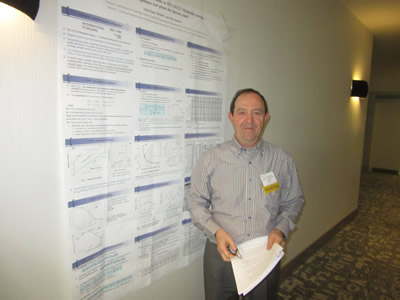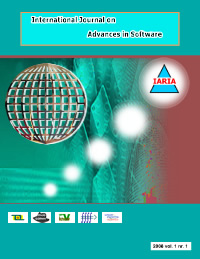VEHICULAR 2025 - The Fourteenth International Conference on Advances in Vehicular Systems, Technologies and Applications
March 09, 2025 - March 13, 2025
VEHICULAR 2025
Onsite and Online Options: In order to accommodate various situations, we are offering the option for either physical presence or virtual participation (pdf slides or pre-recorded videos).
ISSN: 2327-2058
ISBN: 978-1-68558-233-3
VEHICULAR 2025 is colocated with the following events as part of InfoWare 2025 Congress:
- ICCGI 2025, The Twentieth International Multi-Conference on Computing in the Global Information Technology
- ICWMC 2025, The Twenty-First International Conference on Wireless and Mobile Communications
- VEHICULAR 2025, The Fourteenth International Conference on Advances in Vehicular Systems, Technologies and Applications
- INTERNET 2025, The Seventeenth International Conference on Evolving Internet
- COLLA 2025, The Fifteenth International Conference on Advanced Collaborative Networks, Systems and Applications
- INTELLI 2025, The Fourteenth International Conference on Intelligent Systems and Applications
- VISUAL 2025, The Tenth International Conference on Applications and Systems of Visual Paradigms
- HUSO 2025, The Eleventh International Conference on Human and Social Analytics
- BRAININFO 2025, The Tenth International Conference on Neuroscience and Cognitive Brain Information
VEHICULAR 2025 Steering Committee
| |
 |
Khalil El-Khatib
University of Ontario Institute of Technology - Oshawa
Canada
|
|
 |
Éric Renault
ESIEE Paris
France
|
| |
 |
Xiaohong Peng
Birmingham City University
UK
|
|
 |
Yuping He
University of Ontario Institute of Technology
Canada
|
| |
 |
Khalil El-Khatib
University of Ontario Institute of Technology - Oshawa
Canada
|
| |
 |
Éric Renault
ESIEE Paris
France
|
| |
 |
Xiaohong Peng
Birmingham City University
UK
|
| |
 |
Yuping He
University of Ontario Institute of Technology
Canada
|
VEHICULAR 2025 conference tracks:
Hot topics in vehicular systems
Advanced vehicle safety systems; Driver assistance systems; Sensing, vision and perception; Human factors in urban traffic; Driver reactions and predictions; Driver tracking systems; Predict red-light running violations; Rear-view pedestrian detection; Urban truck energy-efficient driving systems; A priori map data; Multi-lane vehicular traffic models; Traffic signs-based fog density models; Social interaction and signaling; Collision avoidance systems; Driving in crowded scenes; Delay estimation; Advances in motorway traffic control; Traffic signal adaptive routing; Long-term trajectory predictions; Visual warnings and accident prevention; Head-up display; Speed harmonization; Vehicle-to-vehicle (V2V) communications; Unmanned ground vehicle paths; Free space detection; Autonomous vehicle in urban environments; Road side sensors; Automated vehicle operation; Motion planning; Navigation tracking; Urban traffic hotspots detection; Pedestrian walking activity recognition and prediction; Pedestrian and bicyclists safety; Evacuation dynamics; Sparse and noisy smartphone location data; Energy management for plug-in hybrid electric vehicles; Heavy-duty vehicles; Freeway traffic management; Adaptive video-streaming dissemination; Streaming content from a vehicular cloud; Wireless degrading communication sensing; Secure information transfer in V2V communication; Coordination of terrestrial vehicles and drones; Carsharing and charging stations; Real-time learning for incident prediction; Carpooling; Bottlenecks in massive crowd flow networks; Pollution models; Driving and urban planning; Mini-drones and taxi-drones; Aeronautical communication with hybrid (manned/unmanned) vehicles; Traffic control with manned and unmanned aerial vehicles; Manned aerial vehicles
Fundamentals on communication and networking
Intelligent vehicular networking; Vehicular communications; Vehicular mobile ad hoc networks; Vehicle-to-infrastructure communications; Roadside-to-vehicle and vehicle-to-vehicle communication; Vehicle-to-vehicle communication; Cellular and satellite communications for vehicular systems; Cross-layer design and optimization for vehicular networks; Future vehicular systems; Vehicular applications
Protocols and mechanisms
Routing protocols for vehicle-to-vehicle communications; MAC layer technologies; Physical layer and RF level technologies; Algorithms, protocols and systems for data dissemination; Channel modeling; Modulation and coding; Multi-channel organization and operation; Antenna technologies; In-vehicle sensor networks
Vehicular data
Mining vehicular data; Vehicular data acquisition; Vehicular data analysis; Vehicular data dissemination; Vehicular datasets; Floating car data (FCD); Business models for vehicular data; Ownership of vehicular data; Vehicular data services; Vehicular data centers
Unmanned vehicles
Terrestrial unmanned vehicles; Unmanned aerial vehicles; Underwater unmanned vehicles; Unmanned sea surface vehicles; Collision control; Traffic surveillance challenges; Path planning and estimation; Communication between unmanned vehicles; Integration of unmanned aerial vehicles in civil airspace; Unmanned vehicular clusters; Designing unmanned vehicular-based systems; Safety of unmanned vehicles; Legal aspects of unmanned vehicular systems; Testbeds and pilot experiments.
Security
Embedded security; Automotive security; Secure automotive communication (on-board and off-board like V2X); Safety and security co-engineering; Tuning protection; Component protection; Vehicular integrity protection; Secure (over-the-air) update; Separation techniques for vehicular networks; Protection of the vehicular safety functionality; Immobilizers; Data privacy (of connected vehicles)
Evaluation
System evaluation methodologies; Performance characterization and analysis; Mobility analysis and vehicle traffic analysis; Safety and non-safety applications; Security issues and countermeasures; Privacy issues; Reliable and fast handover; Green vehicular communications and networking; Power control and scalability issues
Vehicle powering
Renewable energy and vehicles; Green cars; Biofuels; Electrical vehicles; Solar powering cars; Hybrid electric vehicles; Long-term car batteries; Hydrogen fuel cell vehicles; Residential charging stations; Dual-source energy storage
Management and tracking
Networks and systems management; High-speed mobility management; Radio resource, QoS support, and interference management; Channel management; Incident detection; Vehicle tracking
Subliminal characteristics
Driver-centric interfaces; Modalities for subliminal interfaces (visual, auditory, tactile/haptic, olfactory); Perception of subliminal information; Characteristics of subliminally delivered information; Unobtrusive techniques for driver’s state detection; Mitigation or regulation interfaces
Experiments and challenges
Simulation frameworks and real-world testbeds; Standardization in safe autonomous systems; Implementation of mobile IP and migration of IPv6; Testbed experiments and measurements; Business models and policies
Deadlines:
Submission | Nov 22, 2024 |
Notification | Jan 06, 2025 |
Registration | Jan 19, 2025 |
Camera ready | Feb 02, 2025 |
Deadlines differ for special tracks. Please consult the conference home page for special tracks Call for Papers (if any).

